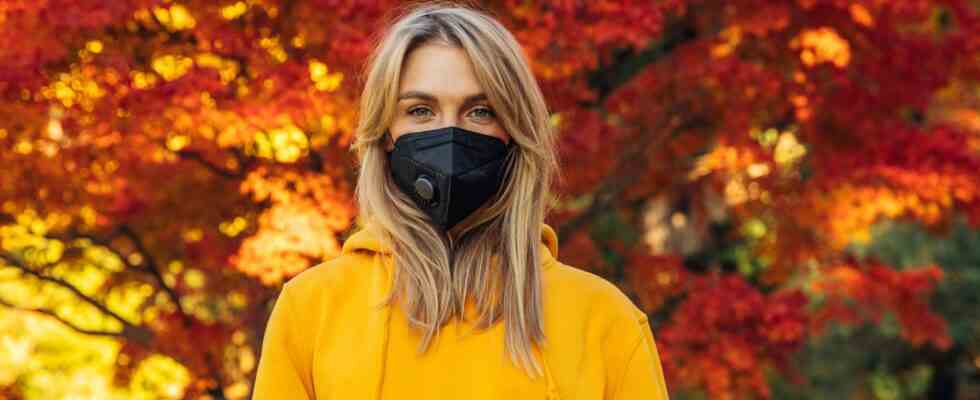Winter is approaching us with giant strides – and with it the question to what extent COVID-19 will restrict our everyday life during the cold months.
Are new virus variants in circulation? Can it be assumed that the number of infections will increase because we are now spending more time indoors? And is the vaccination still worth it?
We put the general practitioner Prof. Jörg Schelling from the group practice in Martinsried together with three risk patients, 13 important questions on how we can now prepare for winter.
1. Is a Corona winter coming our way?
Prof. Schelling: “I’m cautiously optimistic and don’t think it will be as bad as last winter. There is no mutation visible on the horizon, we are currently seeing the offshoots of omicron in the practices. However, COVID-19 will remain – and accompany us annually or regularly, just like the flu. Speaking of the flu: It will definitely be a cold, runny nose, cough, sneeze autumn! However, those who wear a mask can significantly reduce the risk of infectious diseases.”
2. Can vaccination prevent COVID-19?
Prof. Schelling: “Basically, vaccination primarily prevents severe disease progression, inpatient admissions and deaths. That’s what she’s there for. However, anyone who falls ill despite vaccination need not be sad: From an immunological point of view, a mild course is actually the best option, because then you have a mixture of vaccination antibodies and self-made antibodies (due to the infection) in the blood.”
The corona vaccination is there to take the shock out of COVID-19 – and it does it!
Photo: Martinsried General Practice
3. I haven’t had COVID-19 yet, should I get vaccinated now?
Prof. Schelling: “Yes, because you can’t predict how things will go for you. Even healthy people can have severe courses. Vaccination is therefore always a sensible basic protection. You can get them at a vaccination center of your choice or from a doctor you trust – they can then give you individual advice on the vaccination.”
4. I have had COVID one or more times. Does a vaccination do anything at all?
Prof. Schelling: “Vaccination is always helpful. With each new infection, it’s unclear how your body will react this time. This has to do with previous illnesses, which variant you have caught, or how your immune system is currently ‘on it’. According to the STIKO (Standing Vaccination Committee), four contacts with COVID-19 should get us through the winter well. ‘Contact’ means both illnesses and the individual vaccinations. So anyone who has been vaccinated four times is well prepared. Anyone who has received three vaccinations and survived an infection, too.”

I have asthma and therefore an increased risk of a severe course. How can I protect my lungs?
Photo: private
This is how Prof. Schelling answers: “Dear Zoe, it is important that you are well adjusted to your medication. Do you have a cortisone spray at home? Then use it regularly – especially in the cooler months. If you have an infection, talk to your doctor to see if you can increase the dose of the cortisone spray.”
6. What exactly do I have to do if I get infected now?
If your rapid test is positive, there are two possibilities:
►If you are a patient at risk for severe COVID-19 progression, you should speak to your GP about available treatment options as soon as possible after a positive test result (can be confirmed by a PCR test). Together with you, he or she will make the decision as to whether you should start therapy. There are now home treatment options.
►You go into domestic isolation for five days and tell your employer that you are ill. Call your family doctor and ask if they can send you the sick note by post to your home address. Important: Only when you have been symptom-free for 48 hours and your rapid test is negative should you go out with people again.
►If your health is very bad, call the practice – they will tell you whether you should come by or whether you should go straight to the hospital. If you need a certificate of recovery, you would have to have a PCR test done beforehand. The same applies here: Please call the practice first or have them call you back. Don’t just go there!
7. Who is considered a risk patient?
Prof. Schelling: “Think of the prioritization of vaccinations in 2020: The faster you were vaccinated back then, the higher your risk was rated. It started back then with the over 80s, then came the over 70s, then those with chronic diseases who took immunosuppressants, then diabetics with secondary diseases, etc. Ask your doctor how he assesses them, because when identifying at-risk patients several factors play a role: age, weight, previous illnesses, what medication you are taking, etc.”
By the way: If you are very overweight (BMI from 36), you are considered a risk patient!
Prof. Schelling: “COVID-19 multiplies particularly well in abdominal fat. So if you can shed a few pounds, that has only advantages. But please don’t live in fear and terror now or even start a zero diet – that only has a negative effect on your immune system. The good news is that even if you do get sick, there are antiviral therapies that can help. And here, too, I can only advise you to get vaccinated!”

My type 2 diabetes makes me a risk patient for severe courses of COVID-19. But why actually?
Photo: private
This is how Prof. Schelling answers: “Hello Jörg! If your diabetes is well controlled, it is not a risk factor. But you have to know: In general, the body’s counter-regulation of inflammatory processes does not work well in diabetics. The metabolism is heavily burdened and the body cannot organize its defenses as well as it is in a healthy person. The inflammation that COVID-19 creates can derail diabetes and you end up in a vicious circle. Therefore, ask your family doctor to what extent he sees you as a risk patient. In general, the risk is only increased if your long-term sugar level is poor or there is already long-term damage, for example to the kidneys, heart, eyes or if you have nerve failures in your feet and legs.”
9. What are antiviral therapies?
There are three variants of antiviral therapies:
- tablets. The anti-corona pill is available from the family doctor. It is taken in the first five days of the disease to smooth the course.
- One antibody infusion straight into the vein. Those who are ill in the hospital usually receive this in the first five days if the course is severe.
- One Antibody Syringe in the gluteus every six months. This method is approved for both therapy and prevention – but only for people with a poor immune system. Talk to your doctor about whether this is an option for you.
10. What measures can prevent a severe course?
Prof. Schelling: “First and foremost, of course, the vaccination!
For risk patients git: Talk to your family doctor about available antiviral therapies as soon as possible after the onset of symptoms and a positive test result. These significantly reduce the risk of a severe course.
For everyone else, if you are sick, you should take it easy, drink a lot and treat the fever. Then do something good for your immune system, e.g. B. by taking an additional 10 to 20 mg of zinc per day – this is available in the drugstore or in the pharmacy. Zinc has an anti-inflammatory effect, which I also took when I had COVID-19.
In addition, a healthy diet makes sense: Make sure that you eat enough antioxidants, in other words: A smoothie is better than bacon here!”

In my retirement home, everyone has been vaccinated four times, wear a mask, disinfect their hands and the distance rules are also observed. I have not had COVID before but have a pacemaker. What can I do if I do get infected?
Photo: private
Answer from Prof. Schelling: “Dear Werner, if you become infected, call your doctor: Antiviral therapy is an option for you in the first five days of the infection.
Because if you are over 60 years old, according to the RKI’s recommendation for action, you have an increased risk of a severe course of COVID-19. However, the pacemaker does not make you a high-risk patient because it has no effect on your immune system. It would be different if you had other previous illnesses, such as diabetes or a lung disease like COPD.”
12. What treatment options are there?
Prof. Schelling: “In the case of severe courses, the antiviral COVID-19 therapies are given as tablets, infusions or tips. The former in particular are ideal for taking at home and can be prescribed and dispensed directly by your family doctor. In the case of mild courses, you simply have to be patient and sit out the illness. If you have to take painkillers, you should stick to the preparation with which you can otherwise get along well. In general, paracetamol is very well suited, but those who have an increased risk of thrombosis are advised to take the active ingredient ASA, because it has a blood-thinning effect. If you have a lung disease, it can also help to use a spray containing cortisone. Ask your pulmonologist about it!”
13. Which preventive medical check-ups should I definitely attend?
The corona situation has ensured that fewer and fewer people are going to check-ups and have large vaccination gaps.
Prof. Schelling: “That is worrying. Be sure to check your standard vaccinations: you should definitely be vaccinated against flu, whooping cough and pneumonia (pneumococci). I recommend the HPV vaccine for younger people and the shingles vaccine for older people. In addition, you should definitely not miss out on regular cancer screening – if cancer is detected at an early stage, it can be treated much better.
Please don’t let the ‘Check-up 35’ slip by either: Here you can also talk to your family doctor about skin cancer screening or colonoscopy, if that is necessary for you.”
A production by Axel Springer Brand Studios for Pfizer. The content of this page is an offer from the advertising partner. The BILD editorial team was not involved. The quoted expert, Prof. Jörg Schelling, did not receive a fee from either Axel Springer SE or the client who commissioned the brand story for his work on this brand story. The statements solely reflect the view of the quoted expert.


